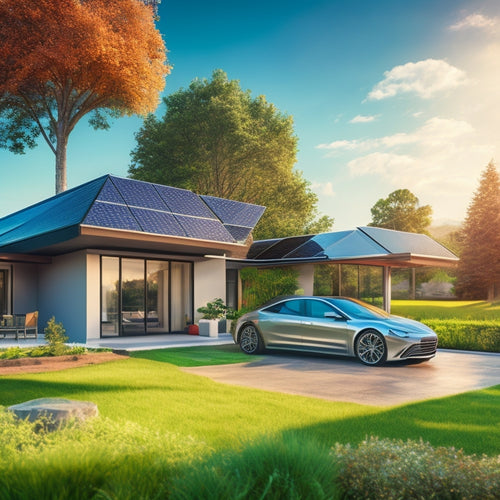
What Are the Average Cost Savings of Solar Panels
Share
You can expect to save between $400 and $1,000 per year on your electricity bills with solar panels, which translates to a total savings of $10,000 to $25,000 or more over the system's 25-year lifespan. This is mainly due to the reduced reliance on the grid and the locking in of fixed energy rates. Your specific savings will depend on factors like energy consumption habits, system efficiency, and local incentives. By understanding the various benefits and incentives, you can maximize your cost savings and make the most of your solar panel investment - and there's more to investigate when it comes to optimizing your solar panel system's performance.
Key Takeaways
- Solar panels can save homeowners between 30% to 50% on their monthly electricity bills, resulting in thousands of dollars in savings over the system's lifespan.
- The Federal Solar Investment Tax Credit (ITC) provides a tax credit of 26% of the total solar panel system cost, reducing the upfront financial burden.
- Net metering allows homeowners to receive credits for excess energy fed back into the grid, offsetting energy consumption during low production periods and leading to significant long-term cost savings.
- Solar panels can increase property value by an average of $15,000, driven by market demand for energy-efficient features and sustainable living.
- Over their 25-year lifespan, solar panels can save homeowners hundreds to thousands of dollars on energy bills, reducing reliance on the grid and carbon footprint.
Understanding Solar Panel Costs
When it comes to switching to solar energy, one of the primary concerns is the upfront cost of solar panels. You're likely wondering if the installation costs will break the bank. The good news is that prices have dropped considerably over the years, making solar energy a more accessible option.
On average, the installation costs for a residential solar panel system range from $15,000 to $30,000. However, this cost can vary depending on factors such as system size, panel efficiency, and local labor costs.
To make solar energy more affordable, various financing options are available. You can opt for a cash purchase, which provides the most long-term savings. Alternatively, you can investigate financing options like solar loans or power purchase agreements (PPAs).
These options allow you to benefit from solar energy with little to no upfront costs. With the right financing option, you can start reaping the benefits of solar energy while minimizing the financial burden.
Federal Solar Investment Tax Credit
The Federal Solar Investment Tax Credit (ITC) is an important incentive for homeowners and businesses investing in solar energy. As a solar panel owner, you're eligible for a tax credit of 26% of the total cost of your solar panel system. This means you'll receive a tax credit of $7,800 on a $30,000 solar panel system, greatly reducing your tax liability.
To qualify for the ITC, you must meet tax credit eligibility requirements, including owning the solar panel system and having a tax liability.
The ITC provides considerable investment benefits, encouraging the adoption of solar energy and reducing your reliance on fossil fuels. By claiming the ITC, you'll not only reduce your tax burden but also increase your return on investment.
The ITC has driven the growth of the solar industry, making solar energy more accessible and affordable. As you consider investing in solar panels, the ITC is an important factor to keep in mind, offering a considerable financial incentive to go solar.
State and Local Incentives
Beyond federal incentives, you can also benefit from state and local incentives that further reduce the cost of going solar. These incentives vary by location, but they can greatly impact your overall savings.
You may be eligible for state incentives, such as tax benefits or installation grants, which can offset a considerable portion of your upfront costs. Local rebates and utility discounts can also help you save money on your solar panel system.
To take advantage of these incentives, you'll need to research program eligibility and funding options in your area. Many community programs offer special financing options or reduced rates for low-income households.
Additionally, some states offer renewable energy certificates (RECs) that can be sold to utilities, providing an additional revenue stream. By combining state and local incentives with federal incentives, you can maximize your savings and minimize your environmental impact.
Net Metering Savings Explained
Your solar panel system's electricity production varies with the seasons, but net metering allows you to capitalize on excess energy generated during peak sun hours.
When your system produces more electricity than you're using at the moment, the excess energy is fed back into the grid and your utility company gives you credit for it. This credit can then be used to offset your energy consumption during periods of low solar production, such as at night or during the winter months.
The net metering benefits are reflected on your utility billing, where you'll see the excess energy produced credited back to you.
This process guarantees that you're only paying for the net amount of energy you consume from the grid. By leveraging net metering, you can maximize your solar panel system's potential and reduce your reliance on the grid.
This results in significant cost savings over time, as you're fundamentally generating your own free energy.
Average Electricity Bill Reduction
You can expect your monthly electricity bill to decrease considerably with solar panels, with average cuts ranging from 30% to 50%.
This translates to substantial energy cost drops, which can add up to thousands of dollars in savings over the system's lifespan.
Monthly Bill Cuts
The homeowner's average electricity bill reduction is a key metric in evaluating the cost-effectiveness of solar panels. You want to know how much you'll save on your monthly bill, and rightly so. The amount you'll save depends on your energy consumption habits and the solar panel efficiency.
| Monthly Energy Consumption (kWh) | Solar Panel Efficiency (%) | Average Monthly Bill Cut ($) |
|---|---|---|
| 500 | 20 | 75 |
| 1000 | 22 | 220 |
| 1500 | 25 | 420 |
| 2000 | 28 | 650 |
As the table shows, if you consume 500 kWh of energy per month and have a 20% efficient solar panel system, you can expect to cut your monthly bill by around $75. If you consume more energy, say 2000 kWh, and have a more efficient system at 28%, you can cut your bill by $650. These numbers are estimates, but they give you an idea of the potential savings. By understanding your energy consumption habits and the efficiency of your solar panel system, you can make informed decisions about your investment.
Energy Cost Drops
Energy consumption patterns play a crucial role in determining the average electricity bill reduction, with solar panels offering considerable cost savings. Your energy consumption habits, including the amount of electricity you use and when you use it, affect the size of your energy cost drops.
By investing in solar technology, you can greatly reduce your reliance on the grid and lower your energy bills.
On average, homeowners who install solar panels experience an electricity bill reduction of 20-30%. This translates to considerable savings over time, especially for those who consume a lot of energy.
By utilizing energy efficiency and solar technology, you can cut your energy costs and enjoy a notable return on investment. Moreover, the more energy you produce, the less you'll need to purchase from the grid, resulting in even greater cost savings.
Kilowatt Hour Savings
Solar panels slash your kilowatt-hour (kWh) consumption, leading to a significant average electricity bill reduction.
By utilizing the power of the sun, you can reduce your reliance on the grid and lower your energy costs. This is especially important for households with high energy demands, as solar panels can provide a substantial kilowatt savings.
Here are three key benefits of kilowatt hour savings:
-
Reduced energy consumption: Solar panels generate clean energy, reducing your kWh consumption from the grid. This leads to lower electricity bills and a smaller carbon footprint.
-
Increased energy efficiency: By generating your own energy, you can optimize your energy usage and reduce waste. This results in a more efficient use of resources and lower costs.
-
Long-term savings: With solar panels, you can lock in a fixed energy rate for years to come, protecting yourself from rising electricity prices and ensuring long-term kilowatt savings.
Solar Panel System Lifespan
Your investment in solar panels is a long-term commitment, and understanding the system's lifespan is crucial to maximizing your returns. A typical solar panel system lasts for 25 years or more, with some manufacturers offering warranties for up to 30 years. During this period, the system's performance will degrade gradually, affecting its energy output.
| Year | Solar Panel Durability | Panel Performance |
|---|---|---|
| 10 | 90% | 90% of initial output |
| 20 | 80% | 80% of initial output |
| 25 | 75% | 75% of initial output |
As the table illustrates, solar panel durability remains high even after 20 years, with a minimal decline in panel performance. This guarantees that your solar panel system continues to generate a significant amount of electricity, reducing your reliance on the grid and your energy bills. By understanding the lifespan of your solar panel system, you can better plan your energy needs and maximize your savings.
Maintenance and Repair Savings
The system's low maintenance needs result in significant cost savings over its lifespan.
You'll benefit from reduced expenditures on routine inspections, unexpected repairs, and equipment upgrades.
Here are three key advantages of solar panel maintenance and repair savings:
-
Warranty coverage: Reputable manufacturers typically offer a 25-year warranty on solar panels, covering defects and ensuring you're protected from costly repairs.
-
DIY maintenance: With a well-designed system, you can perform routine checks and minor maintenance tasks yourself, reducing reliance on professional services.
-
System monitoring: Modern solar panel systems come equipped with monitoring capabilities, allowing you to track performance and identify potential issues before they become major problems.
High-quality installation and equipment also minimize the need for repairs, reducing downtime and associated costs.
Increased Property Value
With a solar panel system installed, homeowners can reap the benefits of increased property value, which can lead to a significant return on investment.
According to a property appraisal study, homes with solar panels sell for an average of $15,000 more than similar homes without them. This increase in resale value is driven by market demand for energy-efficient features, as buyers are willing to pay a premium for eco-friendly homes.
In fact, a survey found that 80% of homebuyers consider energy independence a high priority when searching for a new home. Additionally, solar panels can enhance the aesthetic appeal of your property, aligning with neighborhood trends towards sustainable living.
As a result, your investment potential increases, attracting more buyer interest and ultimately leading to a higher financial return.
Long-Term Energy Savings
You'll start seeing the benefits of solar panels in your wallet, as they considerably reduce your energy bills over time.
By utilizing renewable energy, you'll lower your reliance on the grid and decrease your carbon footprint, contributing to a cleaner environment.
With solar panels, you can expect to save hundreds, if not thousands, of dollars on energy costs in the long run.
Reduced Energy Bills
Installing solar panels on your roof translates to considerable long-term energy savings, which is a major motivator for many homeowners. By utilizing renewable energy sources, you can reduce your energy bills and enjoy lower costs for years to come.
Your energy consumption habits play a considerable role in determining the extent of your savings. For instance, if you consume most of your energy during the day, you can maximize your solar panel efficiency. Additionally, financing options and the installation process can impact your overall savings.
Here are three key factors that influence your reduced energy bills:
-
Your current energy consumption: Understanding your energy usage patterns helps you determine how much energy you can offset with solar power.
-
Local solar markets and incentives: Homeowner incentives, such as tax credits and rebates, can considerably reduce your upfront costs, leading to greater long-term savings.
-
Grid independence and energy storage solutions: By storing excess energy generated during the day, you can reduce your reliance on the grid and enjoy greater energy independence.
Lower Carbon Footprint
A notable advantage of solar panels lies in their ability to reduce your carbon footprint, which translates to long-term energy savings. By utilizing sustainable energy from the sun, you'll greatly decrease your reliance on fossil fuels, resulting in a substantial reduction in greenhouse gas emissions.
In fact, a typical residential solar panel system can offset around 3 to 4 tons of carbon dioxide emissions annually. This is equivalent to planting over 100 trees or avoiding 7,000 miles of driving.
The environmental impact of solar panels is undeniable. By choosing solar, you're contributing to a cleaner, healthier environment for future generations.
Furthermore, solar panels require minimal maintenance and can last up to 30 years or more, ensuring a long-term reduction in your carbon footprint. As the world shifts towards renewable energy sources, investing in solar panels not only benefits your wallet but also the planet.
Frequently Asked Questions
Can I Install Solar Panels Myself to Save Money?
You can attempt a DIY installation with solar panel kits, but it's essential to weigh the risks: incorrect installation can void warranties, compromise efficiency, and even pose safety hazards, potentially offsetting any initial cost savings.
How Do Solar Panels Affect My Home's Resale Value?
You'll enhance your home's resale value by installing solar panels, increasing home equity by up to 17% and appealing to environmentally conscious buyers who drive market demand, ultimately leading to a faster sale and higher selling price.
Are Solar Panels Worth It in Areas With Low Sunlight?
You're wondering if solar panels are worth it in areas with low sunlight. While it's true that solar efficiency decreases in low-sunlight areas, you can still maximize energy production with optimized panel placement and high-efficiency panels.
Do Solar Panels Increase My Property Taxes?
As you utilize the sun's energy, you're likely wondering if solar panels will increase your property taxes. Rest assured, most states offer solar panel exemptions from property tax assessments, so your wallet won't take a hit.
Can I Sell Excess Energy Back to the Grid at Night?
You can sell excess energy back to the grid through net metering, earning energy credits that offset your nighttime consumption, allowing you to capitalize on your solar panel investment and maximize your energy independence.
Related Posts
-

What Solar Panels Work Best With EVS Online?
When shopping for solar panels online to power your electric vehicle, look for high-efficiency models that can withst...
-

Solar Panel System Certification Costs: A 10-Point Breakdown
You're looking to understand the costs associated with solar panel system certification. Your total certification cos...
-

3 Best State and Local Solar Incentives USA
You can greatly reduce your energy dependence and save thousands of dollars by taking advantage of the top state and ...


